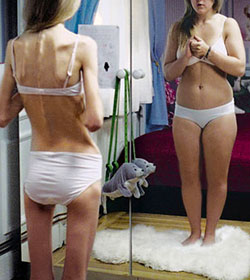 Anorexia nervosa, also referred to as anorexia, is an eating disorder characterized by extremely low body weight, body image distortion and an intense fear of gaining weight. Anorexics severely limit calories, fast and exercise excessively in order to feel control. Anorexia causes sufferers to see themselves as fat even though the rest of the world, their mirrors and their scales reveal they are thin – very often, dangerously thin.
Anorexia nervosa, also referred to as anorexia, is an eating disorder characterized by extremely low body weight, body image distortion and an intense fear of gaining weight. Anorexics severely limit calories, fast and exercise excessively in order to feel control. Anorexia causes sufferers to see themselves as fat even though the rest of the world, their mirrors and their scales reveal they are thin – very often, dangerously thin.
Anorexia nervosa is a serious and potentially deadly illness. Anorexics are classified into two types: the restricting type and the purging type. The restricting type anorexic uses dieting, fasting and/or excessive exercising to lose weight. The purging type anorexic vomits, uses diuretics, laxatives and/or enemas to rid themselves of calories consumed. Anorexic women outnumber anorexic men 9 to 1 in the United States.
If you’ve ever asked yourself, “Am I anorexic?” or if you suspect a loved one suffers from anorexia nervosa, please look over the following warning signs of anorexia:
Behavioral Signs of Anorexia Nervosa
- obsessive fear of being overweight or fat
- distorted body image, low self esteem, and social withdrawal
- rigorously restricting caloric intake and/or fasting
- abnormal preoccupation with calories, fat grams, sugar intake and diets
- eliminating entire food groups (e.g. carbohydrates, sugary foods, foods high in fat, meat, etc.)
- becoming aggressive when forced to eat “forbidden” food
- constant weighing and checking on weight
- excessive, rigid exercising program
- highly sensitive to discussing weight, food and exercising
- constant excuses about not eating or being absent from meals
- frequent denial about hunger
- ritualistic behavior when eating (e.g. chewing each bite for prolonged periods, eating food in a certain order, etc.)
- eating large amounts of food quickly
- frequently using the bathroom immediately after eating
- using diuretics, enemas and/or laxatives inappropriately
- substance abuse
- frequent comments about feeling or looking fat
- wearing baggy clothing to conceal weight loss
Physical Effects of Anorexia Nervosa
- extreme weight loss
- severely underweight (more than 15% under normal body weight)
- hair loss, sunken eyes, dry skin, chapped lips, ashen complexion
- lanugo (fine, downy hair grows on the face, back, arms and legs)
- hypothermia (constantly feeling cold)
- absence of at least three menstrual cycles
- impotency, loss of libido
- difficulty concentrating, memory deficits, headaches
- anemia, bruising easily, extreme fatigue, fainting
- vitamin and mineral deficiencies, osteoporosis, electrolyte imbalance
- constipation, abdominal pain
- low blood pressure
- heart problems including arrhythmia, bradycardia, hypotension and tachycardia
- suicidal thoughts
- death
A person with anorexia nervosa may display any combination of the behavioral signs and physical effects listed above. The purging type of anorexic may display some of the symptoms of bulimia along with the symptoms for an anorexic. The distinction between anorexia and bulimia is the low body weight of the anorexic. The physical effects of anorexia nervosa worsen as the disease progresses. Medical problems associated with anorexia nervosa begin long before the anorexic appears “too thin” – every organ of the body is affected. The medical consequences and psychological complications of anorexia nervosa are devastating.
For many anorexics, starving themselves is a way to feel in control. People with anorexia nervosa often feel powerless over their own lives. Controlling their food intake is a coping mechanism for painful feelings or negative emotions. Limiting calories, fasting, excessive exercising and losing weight makes anorexics feel successful. Unfortunately, that feeling of success is fleeting.
Anorexics believe they will finally feel good about themselves if they lose more weight or reach that “ideal” degree of thinness. However, no amount of weight loss will ever be enough for someone with this eating disorder. Anorexics are incapable of seeing a true image of themselves – their self-image is distorted by the disease. They will never feel good about themselves – physically or emotionally – without proper treatment for anorexia.
People with anorexia nervosa need professional help to overcome their behavior along with confronting the underlying issues that led them down the destructive path of this mental and physical disorder. Most anorexics do not believe they have a problem; they often deny an anorexia diagnosis despite overwhelming evidence to the contrary. If you believe you or a loved one are suffering from this eating disorder, please seek professional help immediately for anorexia treatment.
Sources:
DSM-IV (Diagnostic and Statistical Manual of Mental Disorders)
ICD-10 (World Health Organization’s International Statistical Classification of Diseases and Related Health Problems)
